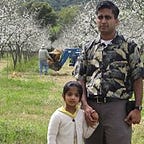Unfathomable Nature
It is quite well known that under the right conditions, a single bacteria can multiply every 20 minutes to become 4096 bacteria in 4 hours and 6872 crores of bacteria in 12 hours. This is what happens in the soil when provided with a temperature close to 20 deg C and protected completely from the Sun and given air water and food to the bacteria. This is the right kind of agriculture that builds soil fertility.
When soil is plowed 60–80 percent of soil carbon becomes Carbon dioxide. 100 grams of carbon added to soil in the form of compost or plant residues, 60 percent and above is lost by plowing. So why do farmers plow their soil. There is only one reason. They think there is no better alternative. Its also because we all now have the machinery (tractor) to do this job of getting smooth fine soil to do the planting work.
For more than ten years I have been a fan of No-till agriculture because I always wanted to build soil organic matter to a minimum six percent level to ensure plants are healthy. Healthy plants give us much less work because there are no diseases to deal with. Permanent soil Agriculture is possible for growing vegetables. In fact, Mapletree farm has no soil plowing going on.
It's important to improvise on technique to ensure no-till is possible and real. Once beds are made, the beds need to be covered and protected from Sun, A layer of compost must be added along with any mineral amendments. Mulch must be added and beds irrigated using a drip system. Water use can be cut to one-sixth of normal use. No-till is critical to the future of farmers and farmland because there are many farms that have run out of water and dependent on rain and underground water. Due to the exploitation of underground water (using excessive water than needed due to free electricity government schemes), many farmers suffer during Summer even though they did not abuse their water resources. No-till is an excellent solution.
At Mapletree, We have farm machinery (implements) that make tillage possible for one inch for direct-seeded vegetables like carrots, beets, radish, greens, etc. For the other vegetables which are transplanted directly into permanent beds, there is no need to disturb the soil at all. The net result is that the beds retain 90% of all the good inputs added to it like compost. Roots are not removed but cut and left inside the soil to rot and provide food for soil organisms. The soil life thrives and explodes in population and converts the very texture of soil into a fluffy dark medium full of life that can support plant growth and ensure that the plants are extremely healthy. Fungal networks increase in soil because we keep inoculating bed soil with fungal spores of different types of mycorrhizae. Fungal networks help convert organic matter in the soil to humus.
In the humification process, digestion is primarily fungal instead of bacterial. Fungi are very different from bacteria, being able to digest far more complex compounds like cellulose, hemicellulose, and complex carbon compounds. Fungi can also digest lipids, plant fats, and oils which bacteria cannot digest. The fungal digestive process is humific, meaning they digest something over and over again until it reaches the point at which it can no longer be digested further. At this point, the digested matter becomes a stable humic substance with a half-life in the soil of hundreds of years. This process is the most efficient way to build soil organic matter.
The Bacteria and fungus also mineralize soil to ensure all needed minerals are supplied to plants. Thus these plants supply minerals needed to humans who consume it. The soil life also helps induce immunity for plants growing in that soil.
All crops have their own inherent immune systems that can provide natural disease and insect resistance when supported with the proper mineral nutrition. This is a well-proven scientific truth that has been helping natural and organic farmers for ages.
